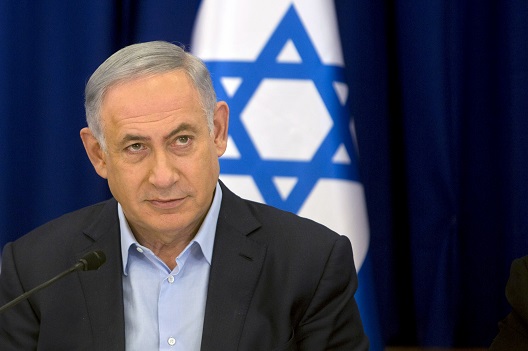 On April 17, 2016 Israeli Prime Minister Benjamin Netanyahu declared, “The time has come after 40 years for the international community to finally recognize that the Golan Heights will remain forever under Israeli sovereignty.…The Golan Heights will always stay in Israeli hands. Israel will never leave the Golan Heights.” Although similar statements by Israeli leaders can be unearthed from archives going back decades, this one was gratuitous and unwise. Even for Israelis who believe, quite sincerely, that permanent retention of the Golan is essential to Israel’s military defense, Mr. Netanyahu’s statement may, over time, leave them less safe than they might have been had he maintained a prudent silence.
On April 17, 2016 Israeli Prime Minister Benjamin Netanyahu declared, “The time has come after 40 years for the international community to finally recognize that the Golan Heights will remain forever under Israeli sovereignty.…The Golan Heights will always stay in Israeli hands. Israel will never leave the Golan Heights.” Although similar statements by Israeli leaders can be unearthed from archives going back decades, this one was gratuitous and unwise. Even for Israelis who believe, quite sincerely, that permanent retention of the Golan is essential to Israel’s military defense, Mr. Netanyahu’s statement may, over time, leave them less safe than they might have been had he maintained a prudent silence.
Apparently that which provoked the statement was an attempt by the Assad regime delegation at the Geneva peace talks to make the recovery of land lost to Israel during the 1967 war an agenda item for eventual direct discussions between it and the opposition delegation. As such it was yet another transparent attempt to avoid the subject matter of the Geneva talks: political transition in accordance with the Geneva Final Communique of June 30, 2012. If Mr. Netanyahu’s response was regrettable, the attempt itself was ironic. The Syrian defense minister who presided over the territorial loss in 1967 and the Syrian president who chose violent repression of his people over negotiating the return of real estate in 2011 share the same last name.
It was not wise for the Israeli prime minister to react the way he did to Assad regime evasion. For the better part of five years Iran and Hezbollah have supported, without reservation, a regime personifying corruption, incompetence, and brutality. This support has not been lost on the Syrian people. For most Syrians, Iran and Hezbollah represent terror and oppression. Their view of the Supreme Leader and his colleague in Lebanon differs little from the view of nearly all Israelis, including the prime minister. Yet now they are being told by that prime minister, in effect, ‘If as Syrians you believe you have the right to recover the Golan Heights, guess what: it’s off the table. You might just as well make common cause with your oppressors, because the land is ours and the subject is closed.’
Indeed, it is precisely the prospect of common cause that may aggravate and perpetuate, quite unnecessarily, an existing security threat to the state of Israel. In light of the prime minister’s statement, why would the Syrian opposition not go to Tehran with the following proposition: ‘We know you are supporting Assad because he does exactly what you want with respect to Hezbollah. We recognize the centrality of Hezbollah in your national security calculations. We are prepared, provided Assad, his family, and his entourage yield power, to guarantee the indefinite maintenance of Iran’s role in Syria and Syria’s full support for Hezbollah in Lebanon. We can work closely with you to repair the image of Iran and Hezbollah in all of Syria, and we can do so on the basis of your support and that of Sayyed Hassan Nasrallah for the recovery of the Golan Heights.’
There is absolutely nothing wrong with Benjamin Netanyahu and, for that matter, most Israelis believing that the Golan Heights should be Israel’s forever. It is a beautiful area that gives Israelis a sense of wide-open space. It has been under Israeli control for very nearly a half century. And surely the chaos that envelops today’s Syria makes most Israelis believe quite fervently that holding the high ground of the Golan is essential for their security. For all Israelis know the situation sinking Syria now may prevail for decades.
The issue here, however, is not one of what Israelis think and want with respect to the Golan Heights. It is one that centers on how a head of government articulates those desires and how his words are processed by neighbors who are struggling to survive in the face of the very same forces that routinely threaten Israel with annihilation.
Prime Minister Netanyahu could have done better. He could have said something like the following: ‘I speak for nearly all Israelis when I say that I love the Golan and I yearn for the day when it is universally acknowledged to be part of Israel. I acknowledge there is a competing claim: one I have contested and one I will continue to contest. But I say this to the people of Syria: when your battered country finally arrives to the promised land of legitimate governance reflecting pluralism, protection for all, and consent of the governed, Israel will be prepared to negotiate full and permanent peace. We will have differing perspectives on territorial matters. But when Syria is delivered from Assad, Iran, Hezbollah, Daesh, Nusra, and all of its torturers, you will find a partner for peace if you want one.’
Frederic C. Hof is a Resident Senior Fellow with the Atlantic Council’s Rafik Hariri Center for the Middle East.
Image: Photo: Israeli Prime Minister Benjamin Netanyahu attends the weekly cabinet meeting in the Israeli occupied Golan Heights near the ceasefire line between Israel and Syria, April 17, 2016. REUTERS/Sebastian Scheiner/Pool

